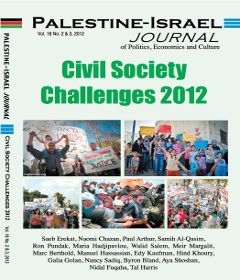Civil Society Organizations (CSOs) are playing an increasingly important role in modern societies. They complement the functioning of the governments by offering services that governments cannot because of budgetary restrictions, contribute to community development in all aspects of life and, most importantly, monitor the functioning of governments and complement the role of parliaments in ensuring accountability. This role is not absolute but is affected by conditions and circumstances within the society. And while the job of the CSO is welcomed in democratic societies, it is rejected and suppressed by authoritarian regimes.
In the first two and half decades after 1967, the Palestinian CSOs developed to become an alternative to the Israeli occupation and attempted to build a parallel infrastructure: a Palestinian entity challenging the occupation and freeing itself from its policy of containing or manipulating the activities of the CSOs. Yet the Israeli military authorities tried by all means to hinder this process, which was seen as an attempt to undermine and de-legitimize the authority of the occupation. Many Palestinian civil society activists were put under house or town arrest or administrative detention or were deported to neighboring countries in an effort to force them to stop their activities. To a great extent, this same parallel infrastructure-building role was played by Jewish organizations under the British Mandate prior to the creation of the State of Israel in 1948.
The Israeli government assumed the role of many CSOs after 1948. A similar phenomenon occurred in Palestinian society after the creation of the PA in 1994. Some of the organizations were absorbed into the new governmental structure, while other CSOs opposed to the Oslo process took some time until they realized the new reality and stopped competing with or duplicating what the new PA government had started to do. However, this attempt was renewed with the increasing influence of the Islamic movement, which used social relief and services as a tool to undermine the PA and gain popularity. It's interesting to note that the same method was used by Jewish religious parties in Israel to attract more followers by offering social aid and services, as done by the Shas party and others.
Recent years have witnessed increasing pressure on the CSOs on both sides of the conflict. In Palestine, mainly after the divisions between Hamas and Fateh which led to Hamas taking over the authority in Gaza Strip, the Fateh-led authority in the West Bank carried out an intensive campaign against all CSOs affiliated with Hamas, dissolving some of them and taking over the properties and administration of others. Similar actions were taken in Gaza by Hamas against CSOs affiliated with Fateh. In both cases, these actions were not restricted to affiliated organizations, but also included organizations which were not affiliated with any party. Obviously, both parties exploited the division as an "opportunity" to tighten their grip on civil society, take over its assets and limit its capability of influence.
Parallel to what was taking place on the Palestinian side, Israeli CSOs have been subjected to a massive campaign of intimidation by right-wing political bodies. Many of these CSOs were accused of not being loyal to the state, because they criticized the practices of the government against the Palestinians or its failure to advance the peace talks. Laws were submitted to the Knesset to limit the freedom of these organizations or to monitor their funding.
The failure of the peace talks, the acceleration of settlement activities in the occupied Palestinian territories and the increasingly oppressive measures against the Palestinians represent a challenge to the bilateral relations between CSOs on both sides. While Palestinian CSOs are demanding a clear position from their Israeli partners against their own government's practices, many Israeli CSOs have failed to meet the level of expectations on the Palestinian side. For example, many did not condemn the war against Gaza or the violation of academic freedom of Palestinian universities. This caused disappointment and led to calls for boycotting Israeli CSOs indiscriminately. Those who call for boycotting the Israelis are accusing anyone who does not respond positively to their call to be "normalizing" with the occupation.
While all agree on boycotting and disinvestment from the Israeli settlements in the OPT, the idea of boycotting Israel or imposing international sanctions against it to force an end to its occupation and discriminatory polices, atrocities and practices against Palestinians is controversial.
Another aspect of the challenges the CSOs on both sides face is the global economic crisis, which has caused a shortage of funding, pushing many of these organizations - mainly those involved in promoting a culture of peace and contributing to dialogue and understanding between the two parties of the conflict - to reconsider their ability to continue to function.
In this issue, Israeli, Palestinian and international experts, scholars and activists debate the challenges and difficulties facing CSOs on both sides and ways and means of coping with them.

